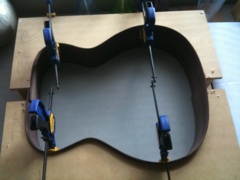I have a nasty commute. 40 miles each way in Houston is about two hours on the road daily. With that kind of time my very large catalog of music gets dull quickly, so I rely on podcasts to fill the gap. I have to say that of all of the things The Almighty Internet has brought, radio is the best. Wait. What I meant was that I listen to a lot of podcasts on a number of different topics. When I have exhausted the reserves of a given set I will go in search of new life and that’s how I found Radio Lab [http://www.wnyc.org/shows/radiolab/]. It’s a great show that deals with science and art. Mostly it’s radio shows the way I would do them if I had the drive. Every show is really a long piece of music from the way the interviews are edited to their presentation. It’s brilliant.
This morning, I pulled down a couple of their older shows to fill the gap and there was a short about Terry Riley’s “In C.” A group of composers was asked to remix it and the results were pretty exciting. For me, they were perfectly timed.
Last night I spent my time in the studio pulling apart a couple of tracks I’ve recorded over the past couple of weeks. All of the tracks were acoustic guitar. Using a variety of simple techniques, I managed to obliterate any reference to the actual instrument and instead created a smear of sound. The structure of each piece was left in tact, but the effect was entirely different. I did the work hastily and without too much thinking. That’s more difficult than it sounds given the nature of software and user interfaces. It’s really hard to simply react with software the way one can with a musical instrument. There’s a lot of work to do in that area. In any case, the results were interesting but there was something missing.
And that’s why “In C” was a good thing to hear this morning. The approach taken by the various composers suggests solutions that I might not have come to as quickly. It’s relatively exciting.
Half of getting good creative work out the door is being open to different ways of thinking about it. I’m intrigued by how events and input that could be taken as random really aren’t (in this case by virtue of the fact that I’m me and I chose to expose myself to a given piece of material) and exactly how important that is to the development of the work.
